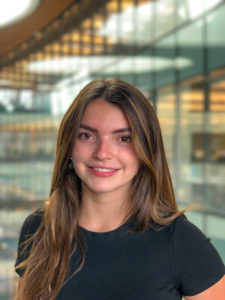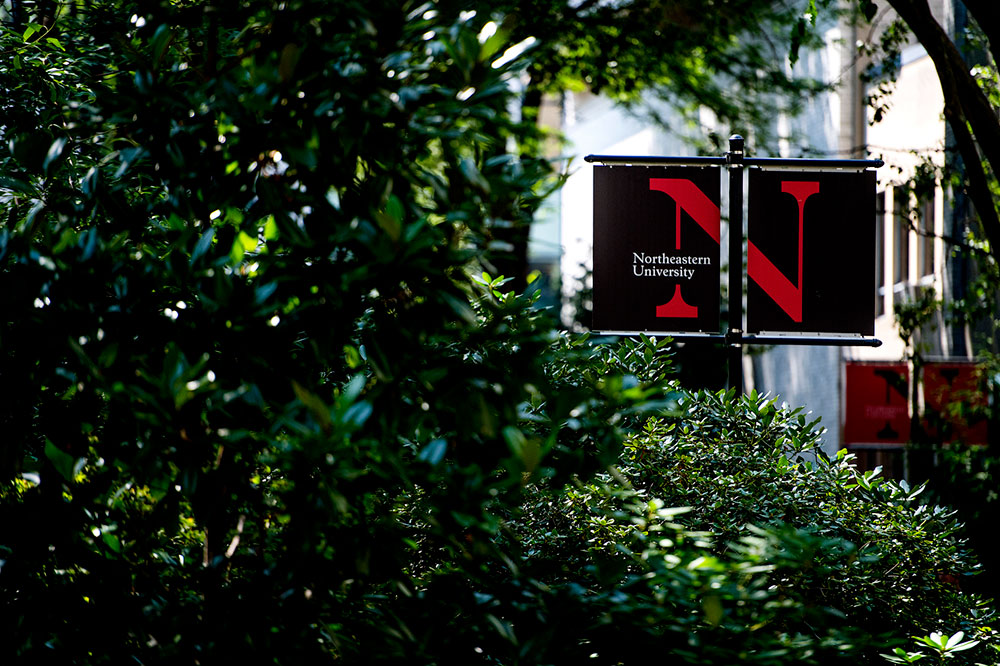Katalina Baehring shares her experience as a CaNCURE Cancer Nanomedicine Co-op program member.
 What are your major, minor(s), and graduation year? Has this always been your course of study, or have you switched paths before?
What are your major, minor(s), and graduation year? Has this always been your course of study, or have you switched paths before?
I am a third-year student majoring in cell & molecular biology. In addition, I have two minors in Spanish and music, and I plan to graduate in the Spring of 2023. Initially, when I was applying to college, I wanted to major in general biology or animal sciences because I planned on becoming a veterinarian. However, when I completed my first semester abroad in Melbourne, Australia, I realized I wanted to apply to medical school. I desired a course of study that focused more on processes occurring at the molecular level of biological systems rather than exploring the organization of life at various levels. Because of this, I changed my major to cell & molecular biology after my first semester.
What initially drew you to apply for and ultimately choose CaNCURE’s Cancer Nanomedicine Co-op program?
After returning from Australia, I was very excited to get involved with student life in Boston, particularly research. However, due to the pandemic, I spent a year taking classes over Zoom and did not have the opportunity to learn and apply biological techniques in a laboratory setting. Nevertheless, I applied to several research co-ops and eventually came across the CaNCURE’s Cancer Nanomedicine Co-op program posting.
I wanted to enroll in this program because of its devotion to providing undergraduate research training and furthering the professional development of its trainees. Aside from matching students with a mentor who best matches their interests and aligns with their research goals, CaNCURE hosts various educational workshops where trainees may share their experiences and learn what kinds of projects their peers are involved with. During the interview process with the associate director of CaNCURE, Dr. Anne van de Ven, I realized that the program’s focus was on creating a rewarding experience for each student that would encourage them to pursue a career in cancer research or a field related to cancer nanomedicine. While these are reasons why I applied to CaNCURE, I ultimately chose this co-op because of how excited the team was to have me join as a trainee and have my first exposure to cancer research through their program. Dr. van de Ven was incredibly kind and understood my worries of not having any previous experience. In addition, she introduced me to my fantastic mentor, who made my time at Massachusetts General Hospital an unforgettable experience.
Tell us about your experience working there.
During my six months in CaNCURE, I worked at Mass. General under my mentor, Yolonda Colson, M.D, Ph.D., the Chief for the Division of Thoracic Surgery. After sharing my goals with her, Dr. Colson introduced me to my supervisors, Mehida Rojas-Alexandre, M.D., and Rong Liu, M.D. They started a new project focused on treating liposarcoma, a rare type of cancer that develops in fatty tissue anywhere in the body. This experiment aimed to use a novel chemotherapy-eluting polymer film as a local drug delivery method to prevent locoregional recurrence following resection of patient-derived xenografts in murine models. I was mainly responsible for monitoring tumor progression, preparing materials for surgery, and, following resection, monitoring for recurrence and overall survival. In addition, I would collect data and organize it, so my supervisors could quickly look back at it and, when necessary, discuss progress.
I participated in lab meetings and shared progress updates with Dr. Colson while learning about my peers’ projects. I had the pleasure of learning from other individuals like Uma Sachdeva, M.D., Ph.D., and William Blessing, Ph.D., who introduced me to cell culture and taught me various techniques and how to maintain a sterile environment at all times when working under a biosafety hood. Outside of research, I attended clinic review sessions and shadowed Dr. Colson in her clinic, which allowed me to learn some basic clinical principles of thoracic surgery and understand how specific features of medical images translated to patient symptoms and prescribing targeted therapies. Dr. Colson’s generosity and willingness to be my mentor inspired me to gain exposure to various projects in such a short period and push out of my comfort zone to learn techniques that I was initially unfamiliar with. Overall, my experience with CaNCURE was incredible and equipped me with several skills and interests that I will carry in future endeavors.
Were there any specific staff or courses at Northeastern that you feel prepared well to take this job?
Before starting the first co-op, all students take “Professional Development for Co-op.” Students communicate their skills and experiences through job search tools like resumes, cover letters, and interviews. They also meet with their co-op advisor before applying for co-ops to ensure their application materials are up to date and best represent their talents.
My advisor and co-op course instructor, Katie Dioli, played a pivotal role in my job search, and I credit her with my success in finding a fantastic co-op quickly. In addition, the professional development course prepared me beyond expectation to become a CaNCURE trainee. Without my advisor, I would not have been as confident in my interviews to answer their questions about previous experiences.
How has this experience informed your opinions on what you want to pursue in the future?
My CaNCURE experience was enlightening in several ways. First, from this experience, I finally understood what I wanted my career path to be. Before becoming a trainee, I was unsure whether I’d be interested in an M.D./Ph.D. program and I didn’t know if I wanted to specialize in oncology.
The CaNCURE co-op helped me realize that, while I have tremendous respect for individuals who dedicate their careers to research, I want to have a job where I will spend the majority of my time seeing patients and designing successful treatment plans based on their unique conditions as well as advances in therapies.
What are some key takeaways that you have gained from this co-op?
Some key takeaways from this co-op experience include understanding how a cancer research lab functions and conducts studies effectively while also developing a more profound respect for the field and how it directly impacts clinical practice. I also realized how complex research can be, especially when the obtained results do not match the expected outcomes, and how it is essential to record every tiny detail of an experiment to identify any procedural errors and ensure the reproducibility of the results once the research is published.
What advice do you have for other students pursuing co-ops similar to CaNCURE?
The most significant advice I can give to students pursuing co-ops is to be confident. If you think you are not the most qualified for the position, apply anyway. Employers are not only looking for students who have the skills related to the work, but they are also interested in hiring students who are eager to learn and are willing to go the extra mile to do their job successfully.
The first interview experience I had ended up rejecting me due to my lack of experience, which, of course, is not the answer one hopes for when applying to jobs, but that didn’t stop me from applying to thirty-two other positions. Two weeks after being rejected, I received three more interview invitations and two job offers within two months of applying for co-ops. If someone had told me a year ago I’d be managing a cancer research project for the Chief of Thoracic Surgery at the number one research hospital in America; I wouldn’t have believed them. I even asked Dr. van de Ven why I was one of eight applicants chosen to join the CaNCURE program, and she told me it was my demeanor during the interview. She understood that I was not the strongest candidate in terms of skills acquired from previous research activities, but she noticed how excited I was about doing cancer research and shared that excitement.
Finally, I would encourage students to apply to co-ops that they 100% see themselves doing for six months. It’s always tempting to apply to so many positions to “secure” at least one job for yourself, but it will save you and employers a lot of time if you focus on a few jobs that you are passionate about. By following this application method, you are bound to earn a position that you will love and may even maintain when you return to classes.
What else are you involved in on-campus, and how do you balance these with your coursework?
I am involved with a few organizations on campus. For example, I work for the admissions office as a Husky Ambassador, which involves giving campus tours to prospective students their families and answering questions about academic and student life.
As a music minor, I participate in the Northeastern University Choral Society, a vocal ensemble that rehearses weekly in preparation for an end-of-semester performance. Since I am half-Colombian and half-German, I have made it my life’s mission to learn my parents’ native languages. To accomplish this, I am involved with the German Society, a club in which students can interact with native speakers and engage in various cultural activities to learn about the German language and culture.
I am also a part of Sigma Delta Pi, which seeks to enrich and further students’ understanding of the Spanish language and culture through a range of immersive events and activities such as classroom presentations and community service.
Taking classes and staying involved with student life is not an easy task, but there are ways in which you can balance your responsibilities and leave some time designated for personal relaxation. For example, I have two different planners: one stays at home with all important dates, whether the due date for a major assignment, an exam or an event. My second planner is always in my backpack, and I use it to keep track of projects and designate the order in which I must complete them based on priority. I also have my schedule saved on my devices, so I know how much time I have in class and how much free time I have to study, attend club meetings, or give campus tours. Planning ahead is the key to completing work on time and knowing when to take a break from extracurricular activities to focus on coursework.

